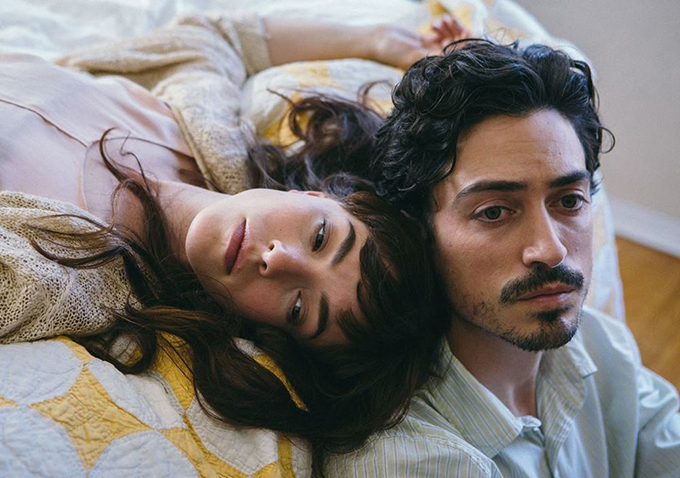 “It’s so raw and honest to the relationships and couples, it almost makes you cringe that you can see yourself in it…It’s those little moments that we’ve all been through.” This isn’t a quote describing writer-director Rafael Palacio Illingworth’s drama, but it might as well be. Instead, it’s from a character describing the unseen film-within-a-film of Henry (Ben Feldman), who has been with Dianne (Olivia Thirlby) for the better part of a decade. "Between Us," which details the struggles of long-term relationships that begin to atrophy over time, gets intimate with Henry and Dianne in their best and worst times, as they both grapple with how to define their love in the face of internal and external expectations. Henry’s next project is a science-fiction film about time travel, and the movie flirts with the idea of time, stretching and condensing it to explore their relationship in an interesting, though not always successful way.
“It’s so raw and honest to the relationships and couples, it almost makes you cringe that you can see yourself in it…It’s those little moments that we’ve all been through.” This isn’t a quote describing writer-director Rafael Palacio Illingworth’s drama, but it might as well be. Instead, it’s from a character describing the unseen film-within-a-film of Henry (Ben Feldman), who has been with Dianne (Olivia Thirlby) for the better part of a decade. "Between Us," which details the struggles of long-term relationships that begin to atrophy over time, gets intimate with Henry and Dianne in their best and worst times, as they both grapple with how to define their love in the face of internal and external expectations. Henry’s next project is a science-fiction film about time travel, and the movie flirts with the idea of time, stretching and condensing it to explore their relationship in an interesting, though not always successful way.
We enter the lives of Henry and Dianne six years into their romance. They’re living together in a Los Angeles apartment, but they are unmarried, which shouldn’t be such a big thing in 2016. Her parents (Lesley Ann Warren and Peter Bogdanovich) offer to help them pay for a down payment for a sun-filled place, but Henry is particularly hesitant. A mortgage is a bigger indication of commitment than a marriage certificate to the couple, who view the move as a daunting, big step. They hastily agree to marry, to get rid of the pressure, and once the initial celebratory mood fades, both Henry and Dianne begin to question their decision and their role in each other’s lives. Their interactions move from sweet to ugly and back again, making choices that could threaten their relationship. A musician (Analeigh Tipton) Henry meets at an event for his film poses a particular sexual temptation, while Dianne encounters several men (Scott Haze, Adam Goldberg) who make her consider her past and future.
While Feldman, and particularly Thirbly do the best with the uneven, sometimes melodramatic material they are given, "Between Us" is an undeniably realistic film about love and commitment, as well as the push and pull dynamics of those two concepts against each other. Early on, there’s a brief sex scene between Dianne and Henry on a wooden floor, which earns points for not being overly made up or stylized. Blushing skin, glowing sweat, and grasping hands mingle in a way that doesn’t feel inauthentic. The script is permeated with unflinching honesty through both dialogue and voiceover from Dianne and Henry. But for all the serious talk — and there is so much State-of-the-Union-type conversation that it is almost exhausting — there are a few moments of levity or joy that give the audience insight into what the pair initially saw in each other or how the couple interacts when there’s no one else around.
After only one other feature film, 2009’s “Macho,” Illingworth has already defined a style and directorial voice. “Between Us” could have been a fairly standard exploration of a single couple’s potential unraveling, but he adds a number of elements that mark the film as his own. Cinematography from Todd Banhazl adds to the unique, lived-in feeling, with plenty of unexpectedly framed shots and camera angles throughout the film. And the pacing is unique; the first half of the film taking place with brief scenes that occur over months and then the movie skips ahead, leaving the audience to fill in the ellipses. The second half of the film while not entirely successful plot wise, retains the sense of authenticity, and while voiceover can be a cheat to offer internal insight, Illingworth layers it over the visuals in an inventive manner that doesn’t detract from the experience.
But ultimately, what keeps “Between Us” from being entirely successful is its depiction of the love between Henry and Dianne. We’re shown plenty of scenes and snippets that make us question the connection between them, but there are fewer instances that demonstrate their love and affection. Meanwhile, the chemistry between Feldman and Thirlby is also lacking compared to other on-screen pairings, but that feels more like an intentional choice to demonstrate their characters’ current relationship status. Where the film fundamentally trips up is failing to invest the audience in the couple emotionally so they can root for them to overcome their various obstacles or weep for them when they cannot.
While they don’t always work, Illingworth makes fascinating directorial choices that keep "Between Us" from being a standard anti-romance indie. And like a potential partner, the flaws here are part of what makes it interesting, but that doesn’t mean that it’s a film you want to fully commit to. [C+]
Browse through all our coverage of the 2016 Tribeca Film Festival by clicking here.

